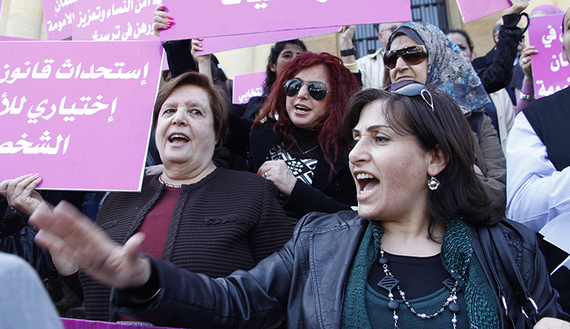
A woman shouts slogans as others hold banners during a sit-in in front of Beirut’s national museum, marking International Women’s Day, March 8, 2012. (photo by REUTERS/Mohamed Azakir)
Women’s empowerment key to development in Arab world
March 8 is International Women’s Day, celebrated throughout the Arab states and the world. Our challenge remains to correct and enhance the status of women in most Arab societies through empowering them, recognizing their equality as citizens and enabling them to participate in political, social and economic life on an equal basis with men.
Women’s equality should not be treated as a concession, but as a basic human right that in many instances has not been only denied, but violated. On this day, the Arabs must be aware that women’s participation and engagement in policy-making, legislation and especially education enhances the human rights of men as well as women.
If one looks at Lebanon, for example, women’s participation in various cabinets is either symbolic, inadequate or absent. These lapses have to be firmly addressed, as they remain one of the flaws that most Lebanese governments have shared. This is, to a very large extent and with few exceptions, common in most Arab countries. While progress has been achieved in some Arab states, most have far to go.
In his message today, the eve of International Women’s Day, UN Secretary-General Ban Ki-moon stated, “The evidence is clear: Equality for women means progress for all.” How true! Arab women’s equality is urgently necessary to achieve the goals of sustainable development. Unfortunately, what remain are discrimination,violence and inequality despite some progress being made.
Perhaps it is imperative that Arab governments and civil societies revisit the Arab Human Development Reports by the UN Development Programme to draw from it policy lessons that can help Arab women and societies realize their potential, correct existent distortions and help reduce violence such as that taking place at this moment.
On this day, let us tap the potential of women’s capacity to heal the prevailing physical, spiritual and moral wounds that have been inflicted on the Arab world and could conceivably have been avoided if women had been more empowered.




